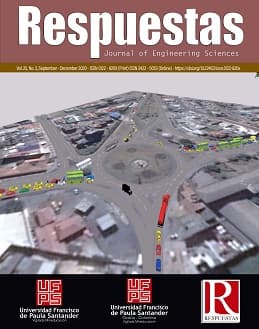Relación con la conciencia fonológica y la alfabetización en ingenieros
Relationship to phonological awareness and engineering literacy
Contenido principal del artículo
La siguiente investigación muestra desde un enfoque cualitativo, como los docentes universitarios de ingeniería conceptualizan la narración. Con lo cual, 250 docentes del departamento Norte de Santander, Colombia; participaron en diferentes escenarios para recaudar la información. Es así, que los datos arrojaron información muy valiosa. Resaltan tres categorías involucradas en la función del storytelling en los ingenieros, la producción y aplicación de ciencia. Por tanto, se concluye que la narración se concibe como el arte de contar una historia; siendo una importante herramienta pedagógica asociado al enfoque, el desarrollo de capacidades del estudiante, determinante para abordar los descubrimientos ingenieriles, para analizar los avances científicos y su contribución en la innovación y el desarrollo de la sociedad. Se encuentra una correlación estadísticamente significativa entre las variables de escritura, lectura y conciencia fonológica; demostrando que los ingenieros que presentan baja puntuación en la escritura también presentan bajos resultados en la conciencia fonológica.
Descargas
Datos de publicación
Perfil evaluadores/as N/D
Declaraciones de autoría
Indexado en
- Sociedad académica
- Universidad Francisco de Paula Santander
- Editorial
- Universidad Francisco de Paula Santander
Detalles del artículo
L. Kornelsen, “The Role of Storytelling at the Intersection of Transformative Conflict Resolution and Peace Education”. Storytelling, Self, Society, vol. 9, pp. 237-260, 2013.
S. A. Madva, “Mentoring Through Storytelling Litigation”. vol. 28, no. 3, 2002.
S. Hinton, “The Art of Storytelling in America”. USA: Columbia University, 2001.
P. Koehler, “Telling God's Stories with Power: Biblical Storytelling in Oral Cultures”, Pasadena: William Carey Library, 2010.
P. S. Cohen, “Theories of Myth Man New Series”, vol. 4, pp. 337-353, 1969.
J, Riascos, “Ancient and Indigenous Stories: Their Ethics and Power Reflected in Latin American Storytelling Movements”, Marvels & Tales, vol. 21, no. 2, pp. 253, 2007.
D. M. Boje, “The Storytelling Organization: A Study of Story Performance in an Office- Supply Firm”, Administrative Science Quarterly, vol. 36, no. 1, pp. 106-126, 1999.
J. H. Lockwood, “Bennett, Noddings, and Reconstruction of Moral Storytelling: Three Levels of Moral Education”, Journal of Thought, vol. 31, no. 3 pp. 5, 1996.
S. Fernandes, “Curated Storytelling: Uses and Misuses of storytelling”, Oxford: Oxford University Press, 2017.
J. Gottschall, “The Storytelling Animal: How stories makes us human”, NY:Houghton Mifflin Harcourt Publishing Company, 2014.
F. Gol, “Biosemiotic Medicine: Healing in the World of Meaning”, Berlin/Heidelberg: Springer, 2016.
R. Méndez-Suárez, “Resultados Nacionales de las pruebas saber 5o y 9º 2009”, Revista Internacional Magisterio Educación y Pedagogía, vol. 51, pp. 78-95, 2011.
A. O. Sierra, M. Vergel-Ortega and J. P. Rojas.Suárez, “Microenseñanza en cálculo vectorial: su impacto desde un enfoque basado en competencias”, Ecoe Ediciones, Bogotá, 2019
D. Chambers, “Storytelling: The Neglected Art”, Elementary English, vol. 43, no. 7, pp. 719, 1966.
T. Massaro, “Empathy, Legal Storytelling, and the Rule of Law: New Words, Old Wounds?”, Michigan Law Review, vol. 87, no. 8, pp. 2099. 1989
M. Maxmeister, “Storytelling for change: story-centered learning for the twenty-first century visionary”, NY: Amazon Kindle, 2017.
C. Dillon, “Telling the Gospel Through Story: Evangelism That Keeps Hearers Wanting More”, Downers Grove: IVP Books, 2012.
F, Carrero, “La comprensión lectora en el alumnado sordo desde la perspectiva de la escuela inclusiva”, IJERI: International Journal of Educational Research and Innovation, no. 8, pp. 206, 2017.
E, Romero-Ramirez, M. Vergel-Ortega, J. M. Torres, “Representaciones sociales de estudiantes universitarios sobre el aprendizaje del cálculo y la química”, Uniediciones. Ibañez S.A.S, Bogotá, 2020.
E. L. Ovalle, C. A. Gomez Colmenares and M. Vergel Ortega, “Geocatatum: Its influence on the development of children‘s geometric thinking”, Journal of Physics: Conference series, vol. 1414, no. 2, 2019.
M. Vergel-Ortega, C. S. Gómez-Vergel and J. F. Caravalho-Casanova, “Cuentos sobre las emociones de jóvenes universitarios durante el proceso de aprendizaje del cálculo en ingeniería”, Respuestas, vol. 25, no. 1, pp. 89-95, 2020. doi.org/10.22463/0122820X.2414.
J. Senehi, “Constructive Storytelling: A Peace Process Peace and Conflict Studies”, vol. 9, no. 2, 2002.
M. Vergel-Ortega, J. Martínez and F. Nieto, “Validez de instrumento para medir el aprendizaje creativo”, Comunicaciones en Estadística, vol. 9, no. 2, pp. 241, 2016.
J. Peck, “Using Storytelling to Promote Language and Literacy Development”, The Reading Teacher vol. 43, no. 2, pp. 141, 1989.
C. Gallo, “The Storyteller's Secret: From TED Speakers to Business Legends, Why Some Ideas Catch On and Others Don't”, New York: St Martin's Griffin, 2017
H. Woodhouse, “Storytelling in University Education: Emotion, Teachable Moments, and the Value of Life”, The Journal of Educational Thought (JET) / Revue de la Pensée Éducative, vol. 45, no. 3, pp. 237, 2011.
M.F. Largo-Leal, J.P. Rojas and M. Vergel-Ortega, “La Empatía en el Aprendizaje de los Estudiantes de Educación Básica Desde la Perspectiva de la Interacción Social”, ECOE Ediciones, Bogotá, 2020.








